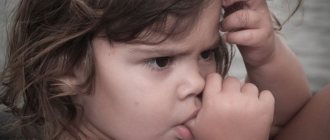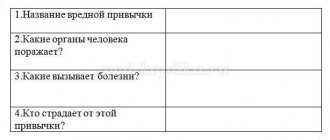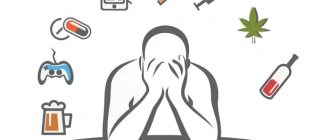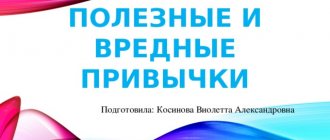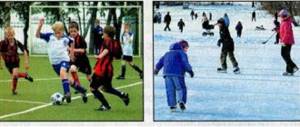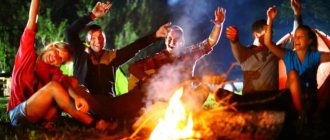Conversation “Talk about bad habits”
Conversation “Talk about bad habits”
Target:
continue to develop a responsible attitude towards your health.
Tasks:
- develop in students a negative attitude towards smoking, alcoholism, tobacco smoking, substance abuse;
- make it clear about the consequences of using psychoactive substances;
- develop the ability to predict the results of your choice.
Progress of the lesson
I. Organizational moment.
Getting students in the mood for work.
II . Introductory conversation by the teacher
. State the topic and purpose of the lesson.
I will begin our meeting with a very optimistic poem, which, with its content, will direct our consciousness to life without bad habits, without complaints about the people around us and all of humanity as a whole.
I really want everyone to be happy! Let the bell ring with cheerful laughter! Let's become a little more patient! Let's become a little kinder! Let's live in peace and harmony! Let the light of the earth illuminate our path! We will work creatively and joyfully, but in such a way as to maintain a healthy lifestyle!!!
— Guys, you already know a lot about your body, you remember the basic hygiene rules well, you know how to identify the causes of many diseases, you are able to provide first aid in extreme situations, you understand the dangers of rash behavior. Today in class we will take another step towards a healthy lifestyle.
The motto of our lesson will be the words:
I know how to think, I know how to reason, I will choose what is healthy.
III. Main part.
- I think that our health depends on the health of our parents, grandparents, on how often we are examined by a doctor, on what kind of air we breathe and what kind of water we drink, and on other things. But a lot depends on us, on what habits we have that prevail.
- What are the habits? (children's answers)
Habits can be useful and harmful.
— What habits do we call useful?
Name useful habits. (children's answers)
— What habits do we call bad?
- Name bad habits. (children's answers)
— Guys, what bad habits have the most dangerous effect on human health? (alcohol, smoking, drugs, substance abuse)
— “What happens when you smoke tobacco?”
Tobacco is an annual plant of the nightshade family whose leaves contain nicotine. When smoking tobacco, part of it burns; The smoke inhaled by the smoker contains nicotine, carbon monoxide, traces of hydrocyanic acid and other chemicals. The most poisonous is nicotine, the vapors of which penetrate the body and cause first excitation and then depression of the central nervous system; constricts blood vessels, irritates mucous membranes. In large doses, nicotine causes seizures and death. Only because nicotine does not enter the body immediately, but in small doses, the smoker does not receive acute poisoning, but is exposed to chronic poisoning. Digestive disorders occur. Nicotine negatively affects the functioning of the heart - it wears out quickly. The lower the grade of tobacco, the more nicotine it contains. Scientists have found that nicotine extracted from five cigarettes kills a rabbit, and from 100 it kills a horse.
Conclusion:
Breathing tobacco smoke is dangerous to your health.
The next dangerous habit is alcohol.
Alcohol is a substance found in alcoholic drinks (vodka, wine, beer). The name “alcohol” itself comes from the Arabic “al-kogol”, which means intoxicating.
— Have you ever met or communicated with people who drink alcohol? (children's answers)
- How do such people behave? (children's answers)
How do they make you feel? (children's answers)
Alcohol creates the illusion of well-being. Interacting with various organs and systems of the human body, alcohol becomes an active participant in metabolism, the body gradually gets used to it and requires it more and more. There is a dependence on alcohol, leading to the disease – alcoholism. Thus, alcohol gradually entangles the mind and will of a person, and once entangled, it holds tightly. Personality destruction in an adult occurs after 10 years, and in children after 3-4 years.
According to the Ministry of Health:
- A smoker's pulse is three times faster than a non-smoker's;
- smokers are more likely to get colds;
- smoking dulls the sense of taste;
- Many fires are caused by cigarettes.
Conclusion:
Alcohol is dangerous to your health.
Drugs are bad habits.
Drugs are substances that have a very harmful effect on the human body and intoxicate it. A person becomes, as it were, bewitched when he begins to use them; he is not his own master. These are the so-called narcotic substances. He no longer wants to do what he loves, everything is uninteresting, a person cannot study, work, or just walk. He just thinks all the time about where to get drugs. A person who starts taking drugs immediately gets used to them and loses his will. Those who do not stop using drugs die from excruciating, terrible pain. A person who uses narcotic substances has disorientation in space and is tormented by nightmares and fears. Friends and relatives stop communicating with him.
Conclusion:
Drugs are the death of humanity. Substance abuse is also a bad habit. Substance abuse is a disease that occurs as a result of the use of substances that cause a short-term feeling of a pleasant mental state. The person becomes irritable, angry, gloomy, and always expects some kind of trouble. His hands shake, his handwriting deteriorates, his speech becomes incoherent and confused. Gradually he degrades as a person, his memory is completely destroyed, his intellect fades. He imagines all sorts of fears, an anxious state. Serious consequences of substance abuse for the condition of internal organs: various diseases of the lungs and gastrointestinal tract develop, since toxic components “burn” the mucous membranes of the kidneys and fail. In case of overdose, death is possible.
Conclusion:
Substance abuse is a poison to human health.
—
How are alcohol, drugs, tobacco, and substance abuse similar? (children's answers)
—
How do surfactants affect the body?
And now I offer you the “9 Commandments of Health”
- clear daily routine;
- Fresh air;
- more laughter;
- physical activity;
- proper nutrition;
- do not drink, do not smoke;
- personal hygiene;
- love for yourself and others; activities to your liking.
But some inhabitants of planet Earth have bad habits and do not want to get rid of them. If you want to join them, or have already joined them, then remember: It's easy to start. Quitting was not the case.
Think about it!
IV. Lesson summary:
— What useful and interesting things did you learn during the lesson?
What can be concluded? Bad habits that stick, attract, pester young people, subsequently become the cause of many misunderstandings, illnesses, and troubles. Love yourself: your Brain, your Liver, your Heart - they are alive, they suffer, get sick, suffocate!!! Let's not be slaves to bad habits! Our advice: “Never smoke! Never drink! Never use narcotic or toxic substances!”
Extracurricular activity for younger students. Useful and bad habits
Extra-curricular event for children of primary school age “Good and bad habits”
Author: Skovoronskaya Galina Nikolaevna, labor instructor of the State Educational Institution of the Republic of Orphanage No. 3 in Taganrog
The extra-curricular event is intended for children of primary school age, educators, and teachers.
Goals: Promoting a healthy lifestyle, developing ideas about good and bad habits. Objectives: 1. Continue to form and consolidate ideas about good and bad habits; 2. Create conditions for the development of such analytical abilities of students as the ability to analyze, contrast, compare, generalize, and draw conclusions; 3. Contribute to the development of a culture of relationships when working in pairs, groups, and teams. Materials and equipment : 1. computer;
2. film “Bad Habits”; 3. physical exercise “Panda”; 4. poems about good and bad habits; 5. sheets with text (bad and good habits) Appendix No. 1; 6. mugs made of green and red paper; 7. sheets of paper size A 4; 8. scissors; 9. glue; Progress of the event:
1. Organizational moment
2. Introductory conversation Hello, guys! Today we will talk about bad habits and their impact on health. What do you think habits are? Give an example of habits. Habits are what we do almost without thinking, acting as if automatically. How are habits formed? To form a habit, you need to repeat an action many times every day. A person has many different habits. What are the habits? Habits can be useful and harmful. Give examples of useful habits (children give examples). Useful habits: wash your face, brush your teeth, do exercises, make your bed, maintain a daily routine, put things in their place, not be late and many other useful habits. They help maintain health, become stronger and more beautiful, organize life conveniently and comfortably, save time, and make a person freer. But, unfortunately, there are also bad habits. And now we will watch a film about bad habits 3. Watching the film “Bad Habits” 4. Discussing the film we watched What bad habits are talked about in the film? (children name habits) What is harmful to human health? What is the harm? Bad habits have a bad effect on the human body; once a person develops them, it is sometimes not easy to give them up. They harm human health, cause addiction and lead to serious illnesses and sometimes death. Remember what not to do! Skip school, be rude to elders and disrespect them, sit a lot in front of the TV or at the computer, eat too much sweets, bite nails, walk in inappropriate places where there is a danger to life, try unfamiliar substances, take alcohol or drugs. 5. Physical exercise “Panda” 6. Game And now we’ll play. You will listen to poems and, if the text talks about a useful habit, then show a green circle, if it talks about a bad habit, a red circle. -You, grandfather, have lived in the world for a hundred years! Tell us, please, what is the secret? “There is no secret here,” the grandfather answered us, “I obeyed the adults Until I was old!” - He who doesn’t clean his nails and doesn’t cut his nails really scares his friends. After all, with dirty nails, long and sharp, they can very easily confuse you with monsters. -Who broke the big vase? I confessed, but not right away. Let them think a little, Let them look at the cat: Maybe the cat broke it? Maybe it's not my fault? - The saddest crocodile in the world had a terrible toothache that never went away. I can tell you why, But only in secret: The crocodile loved sweets, That’s all it’s all about! - All people need kindness, Let there be more kind ones. It’s not for nothing that they say “Good afternoon” and “Good evening” when meeting. - Unearthly beauty, Take your finger out of your mouth! Girls and boys, don't suck your fingers. Dear children, Fingers are not candy. - Mother - Kvochka sent her dear son to school. She said: “Don’t tease!” Don't fight! Don't get cocky! Hurry up, it's time for you! WELL, no fluff or feather! An hour later, barely alive, the Cockerel goes home. - Who said we fought? We didn't fight, we fought. True, we bit a little, and pinched and pricked. True, we crushed each other, and butted and kicked. Of course, we were separated. Of course, we resisted. - Who came to visit us? TARARAM came to us. As soon as he arrived, his pranks began immediately. He scattered all the books, painted everything on the walls, threw a chair over the window, put a cat in the refrigerator, hid grandma's slippers, put rags in the soup for taste, and in the room, in the corner, he drilled a hole in the floor. - Tanya even picks at sour cream! What she is looking for is known only to Tanya. Dipping her finger, capricious Tanya, Probably looking for a cow in sour cream! - Don’t stand aside indifferently, When someone is in trouble. You need to rush to the rescue At any moment, always And if someone, someone will be helped by your kindness and your smile. 7. Practical task We watched a movie, talked about good and bad habits, listened to poems and played, and now this task is for you: from the proposed list of habits, select good and bad habits, stick a green circle on one sheet of paper, select and stick good habits, on the second sheet there is a red circle and bad habits (children show their work). 8. Summary of the lesson In order for you not to forget what habits we talked about in class, we made the following reminder. On the first page you will read the proverb: “If you sow a habit, you will reap a character; if you sow a character, you will reap a destiny.” Some of us have good habits and bad ones. It is rare to meet a person who has only good, healthy habits. Good habits help maintain health and make our lives easier. But bad habits must be fought, and willpower will help you overcome them. Each of you is the master of your life and your health. The most important thing is for you to say today: - no to bad habits! Thank you all very much! I really enjoyed working with you! Appendix #1 - Brush your teeth - Skip school - Make your bed - Eat too many sweets - Play sports - Try unknown substances - Be polite - Take alcohol or drugs - Be neat - Smoking - Wash your hands before eating - Be rude to elders and disrespect them - Be hardworking - Sit a lot in front of the computer and TV - Walk in inappropriate places where there is a danger to life - Bite your nails - Listen carefully to the teacher in class
We recommend watching:
Extracurricular activity in elementary school. Russian tea drinking Extracurricular educational event on the topic: Welcome for grades 3-4 Extracurricular activity, grade 2. Health from nature itself An extracurricular lesson on the surrounding world for elementary school. In the museum
Similar articles:
Lesson in elementary school. Rules of conduct near the water
Extracurricular activity on Pushkin's fairy tales in elementary school
Historical quiz “Wheel of History” for grades 1-4
Extracurricular event on the theme “The Secret of Your Name.” Primary School
